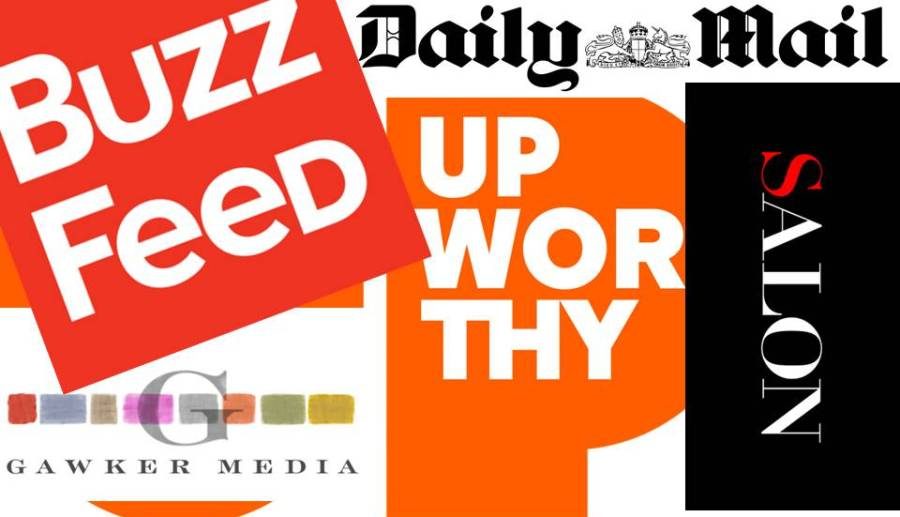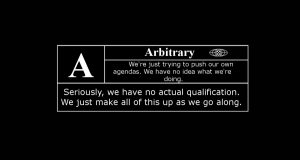You won’t believe how clickbait is ruining society!
Websites such as Buzzfeed and Upworthy produce clickbait articles for the sole purpose of generating ad revenue through sensationalized titles and topics. These articles ignore the tenets of journalism for the sake of making a profit.
November 10, 2016
You’re searching the Internet, and an ad on the corner of the web page catches your eye. You see a buxom, bikini-clad woman with a dog’s mouth photoshopped over her own and a “Has science gone too far?” banner right beneath it. This “article” will cry, begging you to click and discover how a woman could get a muzzle attached to her face.
The thing is that she can’t. That’s stupid, and the producers know it, the writer knows it, and the reader knows it. The problem is that no one cares, because the creators of these articles know what they’re doing and don’t care about spreading false news and compromising journalistic integrity. Like unregulated cancer, these articles metastasize, and actual journalism takes the fall.
“Clickbait” are sensationalized pieces that aim to generate online advertising revenue, at the expense of quality or accuracy. Clickbait articles rely on overstated headlines or eye-catching thumbnail pictures to attract clicks and encourage readers to share with their friends.
It’s capitalism at its finest — producing the lowest form of news to make an easy profit. These websites are going for quantity over quality. It’s a brilliant, albeit horrible, business model. It’s much easier to commission twenty bad articles than it is to write one or two good articles.
Clickbait articles are like Michael Bay movies. They’re big and flashy and nice to look at, but they don’t necessarily have any substance. They don’t have to inform or educate because that’s not their purpose — they exist to draw the eye.
It’s disgusting how ingenious this is. Websites like Buzzfeed, Upworthy, and Cracked take articles from aspiring writers and publish them at little-to-no cost, and then make a profit off of web traffic and advertising revenue. One would think that poorly written articles would be held to the same standard as Pulitzer winners, but it’s actually the opposite.
The influx of clickbait over the last few years has led to a sudden drop in real news. Legitimate new sources have to lower their standards just to catch a reader’s attention. Articles need intense, attention grabbing titles, like “These women have accused Trump of sexual harassment” or “Malaysian schoolgirls tossed in snake pit as part of ‘team building.‘” Newscasters add fearmonger to their resumé in their seemingly-futile attempts to play catch up with websites that tout articles about funny cat pictures and Kendall Jenner’s lip tattoo.
Gawker, the enigmatic blogging site infamous for writing the exact kind of articles that are hurting real journalism, shut down in August of this year. A lengthy court battle after Gawker publishing and refusal to take down the sex tape of former wrestler and actor Terry Bollea, commonly known as Hulk Hogan, put the final nail in Gawker Media’s coffin.
Bollea v. Gawker ended in a $31 million settlement that effectively ruined the company. Nick Denton, co-creator of Gawker, published a final article on the subject on Aug. 22. Denton outlined the results of the case, with a clear slant toward his party, and stated that “even if that decision is reversed or reduced on appeal, it is too late for Gawker itself.” The article is sad. It’s thoroughly depressing as Denton details how the now-former employees of Gawker have to start searching for jobs again after the evil Hulk Hogan stole them away.
That’s the point. Even in its dying moments, Gawker is inflammatory and bitter. Gawker resembles the Greek tragedies of old, except its writers refuse to acknowledge that this is no one’s fault but their own. They chose to make a living off of basic, defamatory, articles that often contradicted each other.
In fact, the same website that is now defunct after refusing to take down Hogan’s sex tape once chided those that chose to look at the pictures released in 2014’s massive leak of dozens of celebrities’ personal, mostly intimate, and sexual photographs. Gawker declared anyone that viewed the photo as perverts violated both the law and the privacy of notable celebrities like Jennifer Lawrence, Kate Upton, and Mary Elizabeth Winstead. The lack of self-awareness is astounding, and even now former Gawker writers don’t see where they contradicted themselves.
Gawker’s ignorance to their own hypocrisy is indicative to the clickbait genre as a whole. No one is vetting these articles, and everyone else suffers for it. Mediocre writers are hired by faceless websites to pen senseless articles about inane topics. When two articles contradict themselves, the news producers do not apologize or explain anything — they just ignore it, and that’s the real problem.








